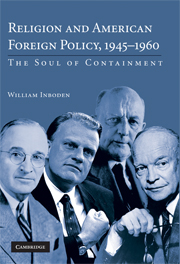Introduction
Published online by Cambridge University Press: 31 July 2009
Summary
Upon appointing Andrei Gromyko as the Soviet Ambassador to the United States, Josef Stalin urged Gromyko to attend an American church each Sunday. Why this unusual advice from the Soviet dictator, a committed atheist? Stalin informed Gromyko that listening to the sermons preached by American ministers would provide the new ambassador with unique insights into the American mindset and value system.
American churches, Stalin believed, helped define America's understanding of itself and its place in the world. One way to consider this book is as a test of Stalin's conviction: how did religion influence American foreign policy in the early Cold War years?
Harry S. Truman, America's first Cold War president, saw the conflict as nothing less than a religious war. Assessing both the nature of the foe and the need for an American response, he warned in an address at a Presbyterian Church that “the danger that threatens us in the world today is utterly and totally opposed to [spiritual values]. The international Communist movement is based on a fierce and terrible fanaticism. It denies the existence of God, and wherever it can it stamps out the worship of God.…God has created us and brought us to our present position of power and strength for some great purpose.” Consider also the language of the Truman Administration's policy directive known as NSC-68.
- Type
- Chapter
- Information
- Religion and American Foreign Policy, 1945–1960The Soul of Containment, pp. 1 - 26Publisher: Cambridge University PressPrint publication year: 2008



